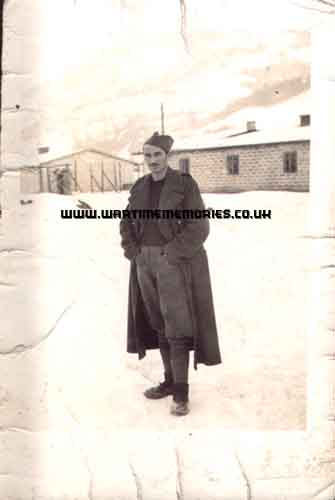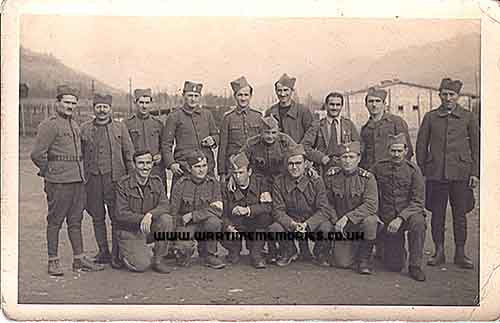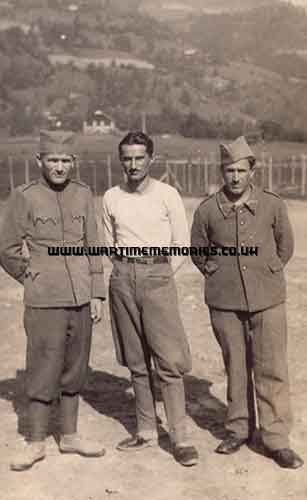Bude Mile Ajdukovic
Yugoslav Army
from:Bunic, Yugoslavia
On 1st November 1937 I was called for two years of military service in Novi Sad airbase. It was pretty late, because many of the fellows of my age had already served their time in the military. I don't know why I had to wait for three years to be called.
Not long after I finished my service in 1939 I was called, in February 1940, to participate in drill at an airbase in Rajlovac and I stayed there until the end of November 1940 - nine months. The reason is known, Hitler set out to conquer Europe. I couldn't stay at home any more, I was afraid that I'd be called again, so I left for Slovenia to work on constructing border fortifications. But the winter of 1940/1941 was so cold that work had to be stopped and I was at home in January. War was on the horizon and I was mobilized again. On 1st April I wore a uniform again and was sent to II airbase in Rajlovac (12 kilometers north-east of Sarajevo, today Bosnia and Herzegovina).
On 6th April I experienced an enormous bombardment in Rajlovac airbase. At 06.15am six platoons were lined up on a runway waiting for an order for that day, when a group of Stukas came from Bulgaria and, in a hedgehop, dropped a load of bombs on us - the hangars, barracks and airstrip. Unfortunately, a platoon of machine gunners on horses were on the airstrip and then chaos started, broken hangar glass, dust of demolished buildings, smoke, wounded soldiers screaming, upset soldiers who couldn't see each other because of the dust. Groups of Stukas returned over and over again until the evening of that day. Those who survived had escaped over the railroad into the woods and roamed around in it. A few of the fellows who had returned to the graveyard of the airbase reported 30--35 killed soldiers. Next day, all the dead soldiers were buried in temporary graves. All of us who had survived the bombardment stayed hidden in the woods near the airbase for the next 5-6 days, but when we saw German tanks unimpeded passing by the roads near Rajlovac and soldiers fleeing, we realized that the fight was over and capitulation was unavoidable.
A few of us who were neighbours continued toward home. We reached the town of Kakanj by foot, and spent the night there and kept going, on foot again, to Slavonski Brod and then by train to Zagreb. When we arrived in Zagreb, immediately after the train stopped, Ustashe (Independent State of Croatia soldiers who collaborated with the Nazis) surrounded our train, got us out, lined us up and took us through the city to a cantonment where we saw about hundred POWs. While we stood on a road lined up we experienced such humiliation by several Ustashe in civilian clothes, with derogatory words and spitting in our faces.
We stayed in the cantonment till they separated us from the Croats and Muslims by different checkups, then sent them home. About 120 of us, Serbs and Slovenians, had been taken over by the Germans and around 27th April the Germans put us in G train wagons and took us to a concentration camp in Maribor (Slovenia). After we arrived in Maribor we were stationed in a horse barracks where they kept hay for horses, and we stayed there for four nights without food and water. Then they let us into a compound where the Germans had gathered 600-700 POWs already. Along with the Serbs and Slovenians there were a few American, British and Greek soldiers. The Americans and British were mainly airmen and the Greeks were soldiers.
Living conditions in the camp were desperate. Only once per day we had fodder beet in the water and 100g of bread - if you were lucky. We slept one on the other, but everybody had to be under the roof at night. Somewhere around 15th or 16th June one of the Ustashe generals showed up in Maribor and wanted to take us over to Croatia. But we, Serbs, had been transferred to a train station warehouse and when Germany attacked the USSR on 22th June they returned us to the concentration camp and from there to Germany to a POW camp. Firstly, the Germans transferred us to Jenbach and then sent us deep into the Tirol by train to Zell am Ziller for construction of a hydroelectric power plant. There we replaced French POWs. Life conditions in this camp were much better. Bread (not so much) but of some potato porridge and barley seeds we had enough. The most important thing was a full stomach. For people in our position accommodation in barracks was bearable. Here we got prisoner numbers, mine was 2727 and was hanged on my neck. After that I became a number instead of a person for the next years of my imprisonment.
For duties we were assigned according to our professions, craftsmen had been sent to shops to help chief craftsmen and workers. Farmers, of which there were the most, were sent to outside jobs.
In the Tirol, the winter of 1941/1942 was harsh and unbearable. The men were poorly dressed, the snow was 70cm high, and the temperature 25 degrees C below zero. Men who worked outside hardly endured the cold. It was hardest of all for those who worked on reinforcing and pouring concrete. The Germans did this, even though the temperature was much below freezing point. I had been assigned to a warehouse, so I could help to handout tools and supplies for the building site, but on 3rd January 1942 an accident had happened. The chief craftsmen sent me for sawdust and while I was filling the bucket with sawdust the circular saw didn't work. The next moment, one Nazi came in, who hasn't worked there and turned on the circular saw. He pushed me onto the machine and it cut off four fingers of my right hand to the palm. After that, I became a disabled person with 60% of disability. The same thing happened to my friend Mile Knezević while he was pushing a small industrial wagon. The engineer ran into him a small industrial locomotive that cut off his right leg up to the knee. Immediately after surgery I was sent, escorted by guards, into a camp's main infirmary for Yugoslavian POWs (Stalag XVII C) in Markt Pongau, Austria. This was a main camp where there were 100 to 150 POWs at any time. Ill prisoners were sent here - healthy prisoners had been sent to working stations over the Europe.
In the infirmary I found frightening conditions - of about 25 to 30 patients every second one was suffering from typhus. Two doctors who treated us were from Yugoslavia and both of them had the rank of major. There was one German doctor who was a captain. A successful cure or drugs did not exist at that time except, so I've heard, the German doctor got an injection and cured us without fear. He really did his best to save as many of us he could. People died and a few of those who survived were so weak and skinny they couldn't walk by themselves without help from others. They lost hair, eyebrows, teeth and they looked like bread crumbs.
One day in our room a Yugoslav doctor came in, I think his last name was Maksimović and he was scared and upset and told us: I'm going to die in 3 or 4 days, this morning in the laundry I find a louse and it's my death. And indeed after 10 days our major doctor, a young man, died even though the German doctor visited him through the night and did everything he could to save him from death.
I was destroyed psychologically. I was full of despair because of my injured hand and much more because of the position I was in and my misgivings that I would not survive if an illness attacked me, because only a few lucky ones survived. Every day I prayed that the German doctor would let me out of the infirmary and, after some time on half of my treatment, he let me go.
After I left hospital in mid January 1942 I saw that between the Yugoslav prisoners there were many British, a few Americans and a lot of Frenchmen, Poles and other European nationalities which Hitler had conquered. We all shared the camp but were placed in different barracks. The food in the camp was terrible at a starvation rate. Tea and 150 grams of pumpernickel bread in the morning; only one ladle, about 400 grams of fodder beets mixed with cabbage, boiled potatoes, browned flour, margarine at noon; dinner we had rarely, never on Sunday.
In mid 1943 Americans started to send packages via the Red Cross from Geneva and the situation became much more bearable. We were given two packages of 4 kg for three men twice a month.
Right beside our camp, approximately 600-700 metres away was a camp with Russian prisoners who had been captured in massive numbers in 1941/1942. That compound was a story in itself. Scaffold, rarely seen anguish. Men died there mostly of starvation, cold, bad conditions or beatings. They were in a camp with four rows of barbed wire, without any rights, human dignity, or international protection because the USSR before war wasn't a member of the International Red Cross. Every day 10 to 15 unlucky ones had died but there were always new guys who replaced unluckiest, already prepared for dying - even before they left the train wagon. I've seen a man of regular height, while Germans weighed him with help of two Poles, he was still alive and he weighed 29.5 kg.
The worst were those who watched men in barracks when they ate their dead comrades. Usually the Poles were charged to bury the dead and sometimes some of our men. Firstly they would dig a trench, typically 20 metres long, a bit deeper and then a car with a cargo of dead people would come in escorted by two guards, and then they would put the dead along the row. If some of them showed signs of life, one of the guards would immediately jump in the trench and, with a boot, finish him off right away. Then a layer of chlorinated lime would be put over them and after that they would lay down another layer of men and chlorinated lime again until they reached the surface. Then they would put dirt over the top - day after day. Near to the Russians others were buried in separate graves. It is estimated that around 800 to 900 Russian (some say more) prisoners were buried there. A few dozens of other prisoners are buried there.
After I left hospital I made a group of friends and with them I met the end of war when the American Army under General Patton liberated us.


